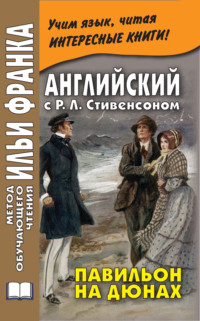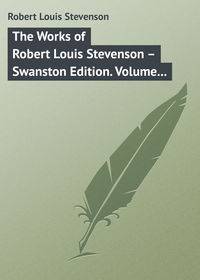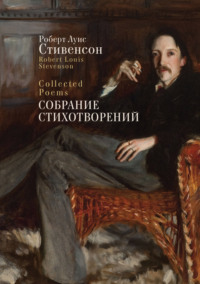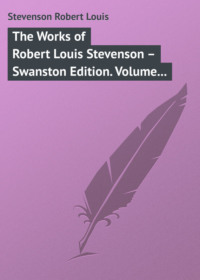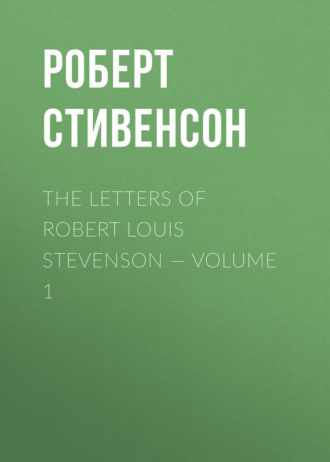 полная версия
полная версияThe Letters of Robert Louis Stevenson — Volume 1
Letter: TO MRS. THOMAS STEVENSON
OCTOBER 1878MY DEAR MOTHER, — I have seen Hamerton; he was very kind, all his family seemed pleased to see an INLAND VOYAGE, and the book seemed to be quite a household word with them. P. G. himself promised to help me in my bargains with publishers, which, said he, and I doubt not very truthfully, he could manage to much greater advantage than I. He is also to read an INLAND VOYAGE over again, and send me his cuts and cuffs in private, after having liberally administered his kisses CORAM PUBLICO. I liked him very much. Of all the pleasant parts of my profession, I think the spirit of other men of letters makes the pleasantest.
Do you know, your sunset was very good? The 'attack' (to speak learnedly) was so plucky and odd. I have thought of it repeatedly since. I have just made a delightful dinner by myself in the Cafe Felix, where I am an old established beggar, and am just smoking a cigar over my coffee. I came last night from Autun, and I am muddled about my plans. The world is such a dance! — Ever your affectionate son,
ROBERT LOUIS STEVENSON.Letter: TO W. E. HENLEY
[TRINITY COLLEGE, CAMBRIDGE, AUTUMN 1878.]MY DEAR HENLEY, — Here I am living like a fighting-cock, and have not spoken to a real person for about sixty hours. Those who wait on me are not real. The man I know to be a myth, because I have seen him acting so often in the Palais Royal. He plays the Duke in TRICOCHE ET CACOLET; I knew his nose at once. The part he plays here is very dull for him, but conscientious. As for the bedmaker, she's a dream, a kind of cheerful, innocent nightmare; I never saw so poor an imitation of humanity. I cannot work — CANNOT. Even the GUITAR is still undone; I can only write ditch-water. 'Tis ghastly; but I am quite cheerful, and that is more important. Do you think you could prepare the printers for a possible breakdown this week? I shall try all I know on Monday; but if I can get nothing better than I got this morning, I prefer to drop a week. Telegraph to me if you think it necessary. I shall not leave till Wednesday at soonest. Shall write again.
R. L. S.Letter: TO EDMUND GOSSE
[17 HERIOT ROW, EDINBURGH, APRIL 16, 1879]. POOL OF SILOAM, By EL DORADO, DELECTABLE MOUNTAINS, ARCADIAMY DEAR GOSSE, — Herewith of the dibbs — a homely fiver. How, and why, do you continue to exist? I do so ill, but for a variety of reasons. First, I wait an angel to come down and trouble the waters; second, more angels; third — well, more angels. The waters are sluggish; the angels — well, the angels won't come, that's about all. But I sit waiting and waiting, and people bring me meals, which help to pass time (I'm sure it's very kind of them), and sometimes I whistle to myself; and as there's a very pretty echo at my pool of Siloam, the thing's agreeable to hear. The sun continues to rise every day, to my growing wonder. 'The moon by night thee shall not smite.' And the stars are all doing as well as can be expected. The air of Arcady is very brisk and pure, and we command many enchanting prospects in space and time. I do not yet know much about my situation; for, to tell the truth, I only came here by the run since I began to write this letter; I had to go back to date it; and I am grateful to you for having been the occasion of this little outing. What good travellers we are, if we had only faith; no man need stay in Edinburgh but by unbelief; my religious organ has been ailing for a while past, and I have lain a great deal in Edinburgh, a sheer hulk in consequence. But I got out my wings, and have taken a change of air.
I read your book with great interest, and ought long ago to have told you so. An ordinary man would say that he had been waiting till he could pay his debts... The book is good reading. Your personal notes of those you saw struck me as perhaps most sharp and 'best held.' See as many people as you can, and make a book of them before you die. That will be a living book, upon my word. You have the touch required. I ask you to put hands to it in private already. Think of what Carlyle's caricature of old Coleridge is to us who never saw S. T. C. With that and Kubla Khan, we have the man in the fact. Carlyle's picture, of course, is not of the author of KUBLA, but of the author of that surprising FRIEND which has knocked the breath out of two generations of hopeful youth. Your portraits would be milder, sweeter, more true perhaps, and perhaps not so truth-TELLING — if you will take my meaning.
I have to thank you for an introduction to that beautiful — no, that's not the word — that jolly, with an Arcadian jollity — thing of Vogelweide's. Also for your preface. Some day I want to read a whole book in the same picked dialect as that preface. I think it must be one E. W. Gosse who must write it. He has got himself into a fix with me by writing the preface; I look for a great deal, and will not be easily pleased.
I never thought of it, but my new book, which should soon be out, contains a visit to a murder scene, but not done as we should like to see them, for, of course, I was running another hare.
If you do not answer this in four pages, I shall stop the enclosed fiver at the bank, a step which will lead to your incarceration for life. As my visits to Arcady are somewhat uncertain, you had better address 17 Heriot Row, Edinburgh, as usual. I shall walk over for the note if I am not yet home. — Believe me, very really yours,
ROBERT LOUIS STEVENSON.I charge extra for a flourish when it is successful; this isn't, so you have it gratis. Is there any news in Babylon the Great? My fellow-creatures are electing school boards here in the midst of the ages. It is very composed of them. I can't think why they do it. Nor why I have written a real letter. If you write a real letter back, damme, I'll try to CORRESPOND with you. A thing unknown in this age. It is a consequence of the decay of faith; we cannot believe that the fellow will be at the pains to read us.
Letter: TO W. E. HENLEY
17 HERIOT ROW, EDINBURGH [APRIL 1879]MY DEAR HENLEY, — Heavens! have I done the like? 'Clarify and strain,' indeed? 'Make it like Marvell,' no less. I'll tell you what — you may go to the devil; that's what I think. 'Be eloquent' is another of your pregnant suggestions. I cannot sufficiently thank you for that one. Portrait of a person about to be eloquent at the request of a literary friend. You seem to forget sir, that rhyme is rhyme, sir, and — go to the devil.
I'll try to improve it, but I shan't be able to — O go to the devil.
Seriously, you're a cool hand. And then you have the brass to ask me WHY 'my steps went one by one'? Why? Powers of man! to rhyme with sun, to be sure. Why else could it be? And you yourself have been a poet! G-r-r-r-r-r! I'll never be a poet any more. Men are so d-d ungrateful and captious, I declare I could weep.
O Henley, in my hours of ease You may say anything you please, But when I join the Muse's revel, Begad, I wish you at the devil! In vain my verse I plane and bevel, Like Banville's rhyming devotees; In vain by many an artful swivel Lug in my meaning by degrees; I'm sure to hear my Henley cavil; And grovelling prostrate on my knees, Devote his body to the seas, His correspondence to the devil!Impromptu poem.
I'm going to Shandon Hydropathic CUM PARENTIBUS. Write here. I heard from Lang. Ferrier prayeth to be remembered; he means to write, likes his Tourgenieff greatly. Also likes my 'What was on the Slate,' which, under a new title, yet unfound, and with a new and, on the whole, kindly DENOUEMENT, is going to shoot up and become a star..
I see I must write some more to you about my Monastery. I am a weak brother in verse. You ask me to re-write things that I have already managed just to write with the skin of my teeth. If I don't re-write them, it's because I don't see how to write them better, not because I don't think they should be. But, curiously enough, you condemn two of my favourite passages, one of which is J. W. Ferrier's favourite of the whole. Here I shall think it's you who are wrong. You see, I did not try to make good verse, but to say what I wanted as well as verse would let me. I don't like the rhyme 'ear' and 'hear.' But the couplet, 'My undissuaded heart I hear Whisper courage in my ear,' is exactly what I want for the thought, and to me seems very energetic as speech, if not as verse. Would 'daring' be better than 'courage'? JE ME LE DEMANDE. No, it would be ambiguous, as though I had used it licentiously for 'daringly,' and that would cloak the sense.
In short, your suggestions have broken the heart of the scald. He doesn't agree with them all; and those he does agree with, the spirit indeed is willing, but the d-d flesh cannot, cannot, cannot, see its way to profit by. I think I'll lay it by for nine years, like Horace. I think the well of Castaly's run out. No more the Muses round my pillow haunt. I am fallen once more to the mere proser. God bless you.
R. L S.Letter: TO EDMUND GOSSE
SWANSTON, LOTHIANBURN, EDINBURGH, JULY 24, 1879MY DEAR GOSSE, — I have greatly enjoyed your articles which seems to me handsome in tone, and written like a fine old English gentleman. But is there not a hitch in the sentence at foot of page 153? I get lost in it.
Chapters VIII. and IX. of Meredith's story are very good, I think. But who wrote the review of my book? whoever he was, he cannot write; he is humane, but a duffer; I could weep when I think of him; for surely to be virtuous and incompetent is a hard lot. I should prefer to be a bold pirate, the gay sailor-boy of immorality, and a publisher at once. My mind is extinct; my appetite is expiring; I have fallen altogether into a hollow-eyed, yawning way of life, like the parties in Burne Jones's pictures... Talking of Burns. (Is this not sad, Weg? I use the term of reproach not because I am angry with you this time, but because I am angry with myself and desire to give pain.) Talking, I say, of Robert Burns, the inspired poet is a very gay subject for study. I made a kind of chronological table of his various loves and lusts, and have been comparatively speechless ever since. I am sorry to say it, but there was something in him of the vulgar, bagmanlike, professional seducer. — Oblige me by taking down and reading, for the hundredth time I hope, his 'Twa Dogs' and his 'Address to the Unco Guid.' I am only a Scotchman, after all, you see; and when I have beaten Burns, I am driven at once, by my parental feelings, to console him with a sugar-plum. But hang me if I know anything I like so well as the 'Twa Dogs.' Even a common Englishman may have a glimpse, as it were from Pisgah, of its extraordinary merits.
'ENGLISH, THE: — a dull people, incapable of comprehending the Scottish tongue. Their history is so intimately connected with that of Scotland, that we must refer our readers to that heading.
Their literature is principally the work of venal Scots.' -
Stevenson's HANDY CYCLOPAEDIA. Glescow: Blaikie & Bannock.
Remember me in suitable fashion to Mrs. Gosse, the offspring, and the cat. — And believe me ever yours,
ROBERT LOUIS STEVENSON.Letter: TO SIDNEY COLVIN
17 HERIOT ROW, EDINBURGH [JULY 28, 1879]MY DEAR COLVIN, — I am just in the middle of your Rembrandt. The taste for Bummkopf and his works is agreeably dissembled so far as I have gone; and the reins have never for an instant been thrown upon the neck of that wooden Pegasus; he only perks up a learned snout from a footnote in the cellarage of a paragraph; just, in short, where he ought to be, to inspire confidence in a wicked and adulterous generation. But, mind you, Bummkopf is not human; he is Dagon the fish god, and down he will come, sprawling on his belly or his behind, with his hands broken from his helpless carcase, and his head rolling off into a corner. Up will rise on the other side, sane, pleasurable, human knowledge: a thing of beauty and a joy, etc.
I'm three parts through Burns; long, dry, unsympathetic, but sound and, I think, in its dry way, interesting. Next I shall finish the story, and then perhaps Thoreau. Meredith has been staying with Morley, who is about, it is believed, to write to me on a literary scheme. Is it Keats, hope you? My heart leaps at the thought. — Yours ever,
R. L. S.Letter: TO EDMUND GOSSE
17 HERIOT ROW, EDINBURGH [JULY 29, 1879]MY DEAR GOSSE, — Yours was delicious; you are a young person of wit; one of the last of them; wit being quite out of date, and humour confined to the Scotch Church and the SPECTATOR in unconscious survival. You will probably be glad to hear that I am up again in the world; I have breathed again, and had a frolic on the strength of it. The frolic was yesterday, Sawbath; the scene, the Royal Hotel, Bathgate; I went there with a humorous friend to lunch. The maid soon showed herself a lass of character. She was looking out of window. On being asked what she was after, 'I'm lookin' for my lad,' says she. 'Is that him?' 'Weel, I've been lookin' for him a' my life, and I've never seen him yet,' was the response. I wrote her some verses in the vernacular; she read them. 'They're no bad for a beginner,' said she. The landlord's daughter, Miss Stewart, was present in oil colour; so I wrote her a declaration in verse, and sent it by the handmaid. She (Miss S.) was present on the stair to witness our departure, in a warm, suffused condition. Damn it, Gosse, you needn't suppose that you're the only poet in the world.
Your statement about your initials, it will be seen, I pass over in contempt and silence. When once I have made up my mind, let me tell you, sir, there lives no pock-pudding who can change it. Your anger I defy. Your unmanly reference to a well-known statesman I puff from me, sir, like so much vapour. Weg is your name; Weg. W E G.
My enthusiasm has kind of dropped from me. I envy you your wife, your home, your child — I was going to say your cat. There would be cats in my home too if I could but get it. I may seem to you 'the impersonation of life,' but my life is the impersonation of waiting, and that's a poor creature. God help us all, and the deil be kind to the hindmost! Upon my word, we are a brave, cheery crew, we human beings, and my admiration increases daily — primarily for myself, but by a roundabout process for the whole crowd; for I dare say they have all their poor little secrets and anxieties. And here am I, for instance, writing to you as if you were in the seventh heaven, and yet I know you are in a sad anxiety yourself. I hope earnestly it will soon be over, and a fine pink Gosse sprawling in a tub, and a mother in the best of health and spirits, glad and tired, and with another interest in life. Man, you are out of the trouble when this is through. A first child is a rival, but a second is only a rival to the first; and the husband stands his ground and may keep married all his life — a consummation heartily to be desired. Good-bye, Gosse. Write me a witty letter with good news of the mistress.
R. L. S.CHAPTER IV — THE AMATEUR EMIGRANT, MONTEREY AND SAN FRANCISCO, JULY 1879-JULY 1880
Letter: TO SIDNEY COLVIN
ON BOARD SS. 'DEVONIA,' AN HOUR OR TWO OUT OF NEW YORK [AUGUST 1879]MY DEAR COLVIN, — I have finished my story. The handwriting is not good because of the ship's misconduct: thirty-one pages in ten days at sea is not bad.
I shall write a general procuration about this story on another bit of paper. I am not very well; bad food, bad air, and hard work have brought me down. But the spirits keep good. The voyage has been most interesting, and will make, if not a series of PALL MALL articles, at least the first part of a new book. The last weight on me has been trying to keep notes for this purpose. Indeed, I have worked like a horse, and am now as tired as a donkey. If I should have to push on far by rail, I shall bring nothing but my fine bones to port.
Good-bye to you all. I suppose it is now late afternoon with you and all across the seas. What shall I find over there? I dare not wonder. — Ever yours,
R. L. S.P.S. — I go on my way to-night, if I can; if not, tomorrow: emigrant train ten to fourteen days' journey; warranted extreme discomfort. The only American institution which has yet won my respect is the rain. One sees it is a new country, they are so free with their water. I have been steadily drenched for twenty- four hours; water-proof wet through; immortal spirit fitfully blinking up in spite. Bought a copy of my own work, and the man said 'by Stevenson.' — 'Indeed,' says I. — 'Yes, sir,' says he. — Scene closes.
Letter: TO SIDNEY COLVIN
[IN THE EMIGRANT TRAIN FROM NEW YORK TO SAN FRANCISCO, AUGUST 1879.]DEAR COLVIN, — I am in the cars between Pittsburgh and Chicago, just now bowling through Ohio. I am taking charge of a kid, whose mother is asleep, with one eye, while I write you this with the other. I reached N.Y. Sunday night; and by five o'clock Monday was under way for the West. It is now about ten on Wednesday morning, so I have already been about forty hours in the cars. It is impossible to lie down in them, which must end by being very wearying.
I had no idea how easy it was to commit suicide. There seems nothing left of me; I died a while ago; I do not know who it is that is travelling.
Of where or how, I nothing know; And why, I do not care; Enough if, even so, My travelling eyes, my travelling mind can go By flood and field and hill, by wood and meadow fair, Beside the Susquehannah and along the Delaware. I think, I hope, I dream no more The dreams of otherwhere, The cherished thoughts of yore; I have been changed from what I was before; And drunk too deep perchance the lotus of the air Beside the Susquehannah and along the Delaware. Unweary God me yet shall bring To lands of brighter air, Where I, now half a king, Shall with enfranchised spirit loudlier sing, And wear a bolder front than that which now I wear Beside the Susquehannah and along the Delaware.Exit Muse, hurried by child's games..
Have at you again, being now well through Indiana. In America you eat better than anywhere else: fact. The food is heavenly.
No man is any use until he has dared everything; I feel just now as if I had, and so might become a man. 'If ye have faith like a grain of mustard seed.' That is so true! just now I have faith as big as a cigar-case; I will not say die, and do not fear man nor fortune.
R. L. S.Letter: TO W. E. HENLEY
CROSSING NEBRASKA [SATURDAY, AUGUST 23, 1879]MY DEAR HENLEY, — I am sitting on the top of the cars with a mill party from Missouri going west for his health. Desolate flat prairie upon all hands. Here and there a herd of cattle, a yellow butterfly or two; a patch of wild sunflowers; a wooden house or two; then a wooden church alone in miles of waste; then a windmill to pump water. When we stop, which we do often, for emigrants and freight travel together, the kine first, the men after, the whole plain is heard singing with cicadae. This is a pause, as you may see from the writing. What happened to the old pedestrian emigrants, what was the tedium suffered by the Indians and trappers of our youth, the imagination trembles to conceive. This is now Saturday, 23rd, and I have been steadily travelling since I parted from you at St. Pancras. It is a strange vicissitude from the Savile Club to this; I sleep with a man from Pennsylvania who has been in the States Navy, and mess with him and the Missouri bird already alluded to. We have a tin wash-bowl among four. I wear nothing but a shirt and a pair of trousers, and never button my shirt. When I land for a meal, I pass my coat and feel dressed. This life is to last till Friday, Saturday, or Sunday next. It is a strange affair to be an emigrant, as I hope you shall see in a future work. I wonder if this will be legible; my present station on the waggon roof, though airy compared to the cars, is both dirty and insecure. I can see the track straight before and straight behind me to either horizon. Peace of mind I enjoy with extreme serenity; I am doing right; I know no one will think so; and don't care. My body, however, is all to whistles; I don't eat; but, man, I can sleep. The car in front of mine is chock full of Chinese.
MONDAY. — What it is to be ill in an emigrant train let those declare who know. I slept none till late in the morning, overcome with laudanum, of which I had luckily a little bottle. All to-day I have eaten nothing, and only drunk two cups of tea, for each of which, on the pretext that the one was breakfast, and the other dinner, I was charged fifty cents. Our journey is through ghostly deserts, sage brush and alkali, and rocks, without form or colour, a sad corner of the world. I confess I am not jolly, but mighty calm, in my distresses. My illness is a subject of great mirth to some of my fellow-travellers, and I smile rather sickly at their jests.
We are going along Bitter Creek just now, a place infamous in the history of emigration, a place I shall remember myself among the blackest. I hope I may get this posted at Ogden, Utah.
R. L S.Letter: TO SIDNEY COLVIN
[COAST LINE MOUNTAINS, CALIFORNIA, SEPTEMBER 1879.]HERE is another curious start in my life. I am living at an Angora goat-ranche, in the Coast Line Mountains, eighteen miles from Monterey. I was camping out, but got so sick that the two rancheros took me in and tended me. One is an old bear-hunter, seventy-two years old, and a captain from the Mexican war; the other a pilgrim, and one who was out with the bear flag and under Fremont when California was taken by the States. They are both true frontiersmen, and most kind and pleasant. Captain Smith, the bear-hunter, is my physician, and I obey him like an oracle.
The business of my life stands pretty nigh still. I work at my notes of the voyage. It will not be very like a book of mine; but perhaps none the less successful for that. I will not deny that I feel lonely to-day; but I do not fear to go on, for I am doing right. I have not yet had a word from England, partly, I suppose, because I have not yet written for my letters to New York; do not blame me for this neglect; if you knew all I have been through, you would wonder I had done so much as I have. I teach the ranche children reading in the morning, for the mother is from home sick. — Ever your affectionate friend,
R. L. S.Letter: TO SIDNEY COLVIN
MONTEREY, DITTO CO., CALIFORNIA, 21ST OCTOBER [1879]MY DEAR COLVIN, — Although you have absolutely disregarded my plaintive appeals for correspondence, and written only once as against God knows how many notes and notikins of mine — here goes again. I am now all alone in Monterey, a real inhabitant, with a box of my own at the P.O. I have splendid rooms at the doctor's, where I get coffee in the morning (the doctor is French), and I mess with another jolly old Frenchman, the stranded fifty-eight- year-old wreck of a good-hearted, dissipated, and once wealthy Nantais tradesman. My health goes on better; as for work, the draft of my book was laid aside at p. 68 or so; and I have now, by way of change, more than seventy pages of a novel, a one-volume novel, alas! to be called either A CHAPTER IN EXPERIENCE OF ARIZONA BRECKONRIDGE or A VENDETTA IN THE WEST, or a combination of the two. The scene from Chapter IV. to the end lies in Monterey and the adjacent country; of course, with my usual luck, the plot of the story is somewhat scandalous, containing an illegitimate father for piece of resistance... Ever yours,
R. L. S.Letter: TO SIDNEY COLVIN
MONTEREY, CALIFORNIA, SEPTEMBER 1879MY DEAR COLVIN, — I received your letter with delight; it was the first word that reached me from the old country. I am in good health now; I have been pretty seedy, for I was exhausted by the journey and anxiety below even my point of keeping up; I am still a little weak, but that is all; I begin to ingrease, it seems already. My book is about half drafted: the AMATEUR EMIGRANT, that is. Can you find a better name? I believe it will be more popular than any of my others; the canvas is so much more popular and larger too. Fancy, it is my fourth. That voluminous writer. I was vexed to hear about the last chapter of 'The Lie,' and pleased to hear about the rest; it would have been odd if it had no birthmark, born where and how it was. It should by rights have been called the DEVONIA, for that is the habit with all children born in a steerage.


